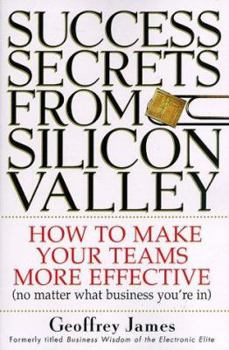Success Secrets from Silicon Valley: How to Make Your Teams More Effective (No Matter What Business You're In)
Select Format
Select Condition 
Book Overview
No Synopsis Available.
Format:Hardcover
Language:English
ISBN:0812929764
ISBN13:9780812929768
Release Date:April 1998
Publisher:Crown Business
Length:278 Pages
Weight:0.56 lbs.
Dimensions:0.7" x 5.5" x 8.3"
Customer Reviews
2 ratings
Companies that value human capital have a competive edge
Published by Thriftbooks.com User , 25 years ago
SUCCESS SECRETS FROM SILICON VALLEY is a thoroughly enjoyable book that takes a look at why Silicon Valley companies are so successful.James' point-of-view is that these companies are able to win because they value their human capital and create jobs that provide scope for human ambition and expression for human creativity. They manage by lending support, not by imposing control, and they treat employees as peers, not children. Instead of asking "How can we get everyone to march in step?" they ask, "Do we have sufficient diversity to approach this market?"The book could serve as a mandate for change management. It recounts numerous examples of companies given a run for their money by small start-ups. For instance, take IBM. In 1984, IBM completely dominated the computer industry. It had fanatically loyal customers, great management, and an enviable image. It had an enormous was chest with which to capture any market. And, it had just invented the personal computer. So how did an 18 year old freshman, a kid probably wondering what to do on Saturday night, in just thirteen years, grow a company to 8,000 people and end up selling more personal computers than the inventor? Michael Dell had no revenues, no customers, no capital, no experience, no image and no product to call his own. How he won is the story of how management vision and corporate culture has to change to stay competitive in the 21st century.It does not matter that the examples come from Silicon Valley; the book could serve as an abridged change management manual for any company desiring to replicate the success culture of these upstarts. Size isn't the issue. Culture is. If, at times, James's points seem self-evident and appear to be the exaltation of common sense, then tell me, where is Digital Equipment Corporation today? Anybody ever hear of Wang? According to James, a company doesn't have to be small to organize into teams and autonomous workgroups. He makes the point that the PC was created within a huge corporation - but as far away from headquarters as possible. Unfortunately, after Don Estridge, the "father" of the IBM PC, was killed in a plane crash, IBM's bureaucrats descended on the PC division "like a plague of blue-suited locusts". They tried to implement strategies that had made sense in the past but were hopelessly outdated in the world where "quick to market" is key."Success Secrets" devotes a chapter to each of eight main change points: Business is an ecosystem, not a battlefield; Corporations are communities, not machines; Management is service, not control; Employees are peers, not children; Motivate with vision, not fear; Change is growth, not pain; Computers are servants, not masters; Work is play, not toil.Each chapter is organized in an easy to follow format : Silicon Valley mindset; traditional mindset; a case study; strategies; quiz (to determine "gaps" in an organization) and points to ponder which se
Why Silicon Valley companies are different!
Published by Thriftbooks.com User , 26 years ago
This book captures the essential elements of the overall organizational strategy developed and applied in Silicon Valley over the past decades. The author captures and illustrates many of the sub-strategies that were originally used by many of the founders of Silicon Valley, such as David Packard (see: "The HP Way"). One of the primary benefits of the present book is the classification of these strategies in an easy-to-understand, numeric order, accompanied by excellent examples and quotes from people using these strategies. In addition, the inclusion of "quizes" and "points to ponder" at the end of each chapter help the reader to ascertain where their present organization is in relationship to the Silicon Valley high-growth company model. While the average Silicon Valley company is living the ecosystem described, the greatest value of the book may be its use as a teaching tool for the extension of a Valley company's culture to team members in non-Valley locations or subsidiaries, or as a teaching mechanism for other companies desiring to replicate the results achieved by Valley companies.





